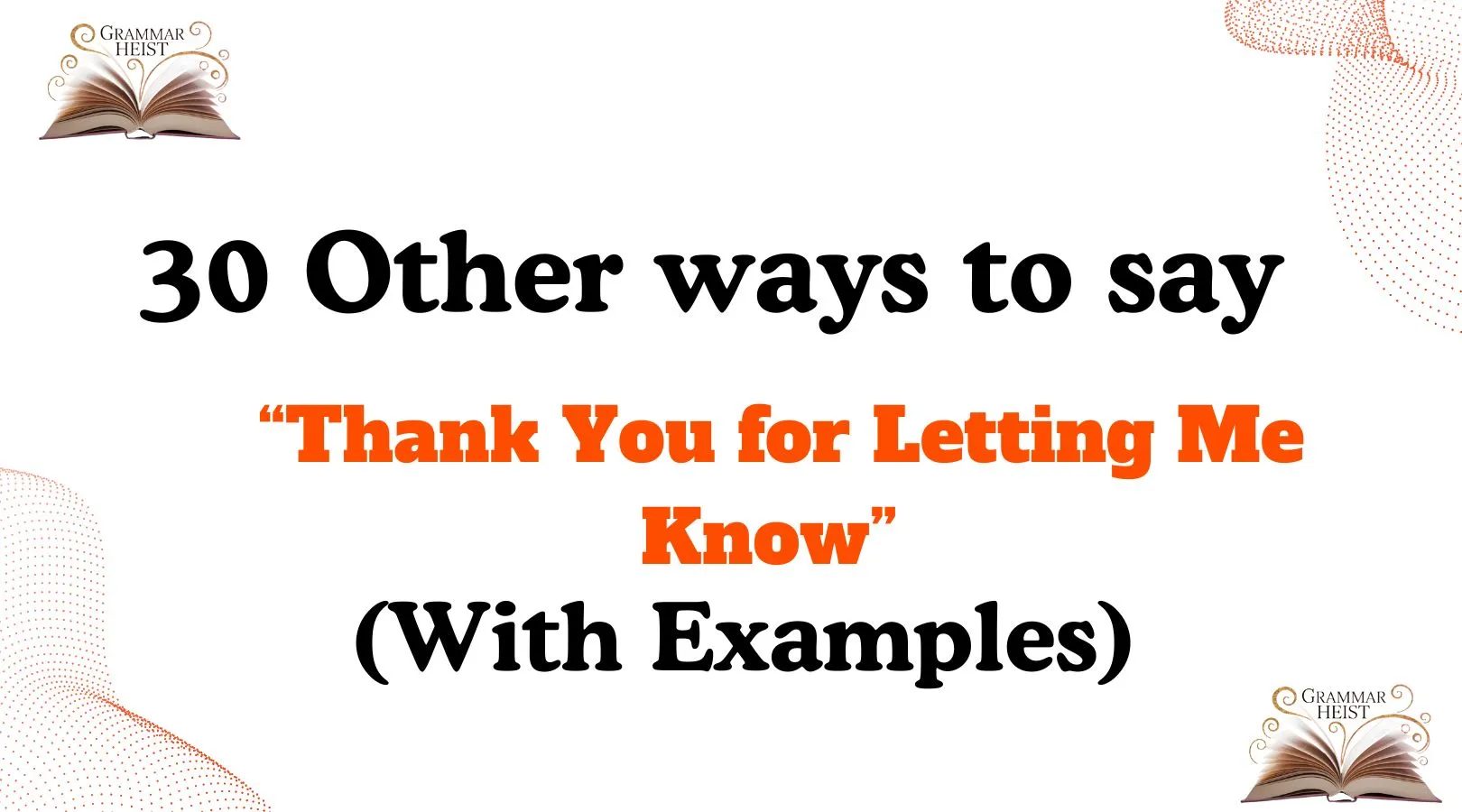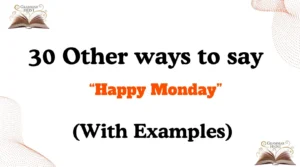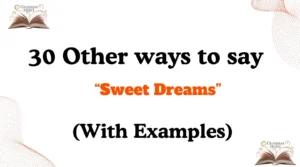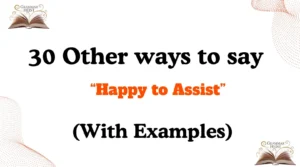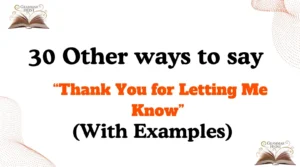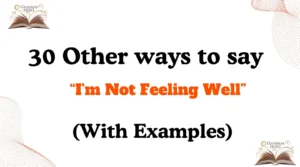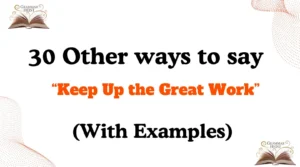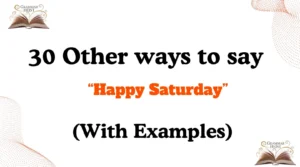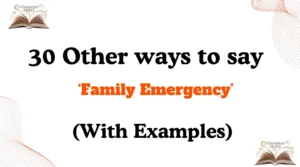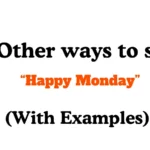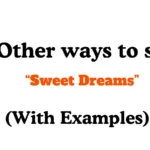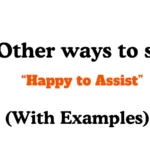Sometimes, a simple “thank you for letting me know” can feel too plain or routine—especially when you want to sound warm, professional, or genuinely appreciative. Finding the right words can make your message feel more personal, thoughtful, and human. Whether you’re replying to an update, a correction, or a piece of feedback, using the right phrase shows empathy and emotional intelligence.
In this article, you’ll discover 30 other ways to say “thank you for letting me know”—each with examples, tone, and the right time to use them.
What Does “Thank You for Letting Me Know” Mean?
The phrase “thank you for letting me know” is a polite way of expressing gratitude for information. It’s often used in emails, texts, or professional messages to acknowledge that someone shared an important update.
It’s a small phrase, but it carries a big meaning—it shows respect, attentiveness, and appreciation for the person who kept you informed.
Is It Professional or Polite to Say “Thank You for Letting Me Know”?
Yes, it’s both professional and polite. It’s perfectly suitable for workplace communication, client interactions, and even casual messages.
However, in certain contexts, using a slightly warmer or more specific alternative can make your response stand out and feel more human. That’s where these 30 alternatives come in.
Pros and Cons of Saying “Thank You for Letting Me Know”
Pros:
- Simple and universally understood.
- Polite and professional in any setting.
- Works well in emails or messages.
Cons:
- Can sound repetitive or generic.
- Lacks emotional warmth in casual situations.
- May not always reflect genuine appreciation.
“Thank You for Letting Me Know” Synonyms
- I Appreciate the Update
- Thanks for Keeping Me Posted
- I Appreciate You Letting Me Know
- Thanks for the Heads-Up
- Thanks for the Information
- Appreciate the Notice
- Thank You for the Clarification
- I Value the Update
- I Appreciate the Heads-Up
- Thank You for Sharing That
- Thanks for Informing Me
- I’m Grateful for the Update
- Thanks for Reaching Out
- Thanks for the Reminder
- I Appreciate the Transparency
- Thanks for Your Quick Response
- I Appreciate the Communication
- Thanks for Bringing That to My Attention
- I Appreciate You Keeping Me in the Loop
- Thanks for Taking the Time to Inform Me
- Thanks for the Notice
- I Appreciate Your Prompt Update
- Thanks for Filling Me In
- I Appreciate the Effort to Inform Me
- Thanks for Notifying Me
- I’m Glad You Told Me
- I Appreciate Your Honesty
- Thanks for Making Me Aware
- I Appreciate You Taking the Time
- Thanks for Your Transparency
1. I Appreciate the Update
Scenario: Use when someone gives you a progress or project update.
Examples:
- I appreciate the update—thank you for keeping me in the loop.
- Thanks! I appreciate the update and the effort you put in.
- Appreciate the update; that helps a lot.
Tone: Professional and appreciative.
Explanation: This phrase works well in emails and messages where you want to sound thankful but efficient.
2. Thanks for Keeping Me Posted
Scenario: Great for casual updates or ongoing communication.
Examples:
- Thanks for keeping me posted about the meeting.
- Really appreciate you keeping me posted on the progress.
- Thanks for the heads-up and keeping me in the loop.
Tone: Friendly and conversational.
Explanation: This is a light, informal way to thank someone without sounding overly formal.
3. I Appreciate You Letting Me Know
Scenario: When you want to emphasize gratitude toward the person, not just the message.
Examples:
- I appreciate you letting me know about the schedule change.
- Thanks—I appreciate you letting me know in advance.
- Really appreciate you letting me know.
Tone: Warm and personal.
Explanation: Adds a human touch by showing gratitude for their effort to inform you.
4. Thanks for the Heads-Up
Scenario: When someone alerts you about something upcoming or important.
Examples:
- Thanks for the heads-up about tomorrow’s deadline.
- Appreciate the heads-up! That saves me a lot of time.
- Thanks for giving me a heads-up—I’ll adjust accordingly.
Tone: Friendly and appreciative.
Explanation: Common in casual or semi-professional settings; shows alertness and gratitude.
5. Thanks for the Information
Scenario: Suitable for data, instructions, or factual updates.
Examples:
- Thanks for the information—it’s very helpful.
- I appreciate the information and your quick response.
- Thanks for the info, that clarifies everything.
Tone: Neutral and polite.
Explanation: Best for formal or transactional exchanges.
6. Appreciate the Notice
Scenario: When someone gives you advance warning or notice.
Examples:
- Appreciate the notice about the delay.
- Thanks, appreciate the notice—it helps with planning.
- I appreciate the notice and your honesty.
Tone: Professional and respectful.
Explanation: Ideal for situations where timing matters.
7. Thank You for the Clarification
Scenario: When someone clears up confusion or explains something.
Examples:
- Thank you for the clarification; that helps a lot.
- Appreciate the clarification on this matter.
- Thanks for clarifying, I understand now.
Tone: Professional and sincere.
Explanation: Use when accuracy or understanding is the focus.
8. I Value the Update
Scenario: When someone provides insight or important feedback.
Examples:
- I truly value the update—thank you.
- Thanks, I value your communication.
- I value the update and your attention to detail.
Tone: Respectful and polished.
Explanation: Sounds thoughtful and is great for client or senior communications.
9. I Appreciate the Heads-Up
Scenario: Similar to “thanks for the heads-up” but more professional.
Examples:
- I appreciate the heads-up about the change in plan.
- Appreciate the heads-up—it’s good to know in advance.
- Thanks, I appreciate the heads-up.
Tone: Semi-formal and warm.
Explanation: A polite upgrade to a casual phrase.
10. Thank You for Sharing That
Scenario: When someone gives you insight, feedback, or a personal update.
Examples:
- Thank you for sharing that with me.
- Appreciate you sharing this—it means a lot.
- Thanks for sharing your thoughts.
Tone: Empathetic and warm.
Explanation: Great for personal or emotional conversations.
11. Thanks for Informing Me
Scenario: When someone passes on factual or official information.
Examples:
- Thanks for informing me about the policy change.
- Appreciate you informing me early.
- Thanks for informing me—it helps a lot.
Tone: Polite and businesslike.
Explanation: Common in formal workplace emails.
12. I’m Grateful for the Update
Scenario: When someone took time to reach out and inform you.
Examples:
- I’m grateful for the update, thank you.
- Really grateful for the update and your time.
- I’m truly grateful you reached out to tell me.
Tone: Warm and appreciative.
Explanation: Adds depth and sincerity to your gratitude.
13. Thanks for Reaching Out
Scenario: When someone contacts you first to share news or information.
Examples:
- Thanks for reaching out to let me know.
- Appreciate you reaching out and keeping me posted.
- Thanks for getting in touch—it’s good to know.
Tone: Friendly and open.
Explanation: Perfect for networking or polite replies.
14. Thanks for the Reminder
Scenario: When someone reminds you of something important.
Examples:
- Thanks for the reminder! I almost forgot.
- Appreciate the reminder before the meeting.
- Thanks, that reminder helped a lot.
Tone: Warm and casual.
Explanation: Keeps things light and friendly while being thankful.
15. I Appreciate the Transparency
Scenario: When someone shares honest or clear information.
Examples:
- I appreciate the transparency—it means a lot.
- Thanks for being upfront, I value the honesty.
- Appreciate the transparency—it helps build trust.
Tone: Professional and respectful.
Explanation: Excellent for leadership or client communication.
16. Thanks for Your Quick Response
Scenario: When someone replies promptly.
Examples:
- Thanks for your quick response!
- Appreciate your prompt reply—it helps me plan.
- Thanks for getting back to me so quickly.
Tone: Professional and courteous.
Explanation: Common in business communication to show gratitude for timeliness.
17. I Appreciate the Communication
Scenario: When you want to acknowledge consistent communication.
Examples:
- I appreciate the communication—it keeps things clear.
- Thanks, I appreciate the regular updates.
- Appreciate the communication—it makes a difference.
Tone: Professional and appreciative.
Explanation: Best for teamwork and collaboration settings.
18. Thanks for Bringing That to My Attention
Scenario: When someone points out an issue or concern.
Examples:
- Thanks for bringing that to my attention.
- Appreciate you catching that error.
- Thanks, I’ll take a closer look.
Tone: Professional and composed.
Explanation: Useful in problem-solving or management contexts.
19. I Appreciate You Keeping Me in the Loop
Scenario: When someone ensures you’re updated on progress.
Examples:
- I appreciate you keeping me in the loop!
- Thanks for keeping me updated.
- Appreciate the effort to include me.
Tone: Friendly and inclusive.
Explanation: Encourages collaboration and trust.
20. Thanks for Taking the Time to Inform Me
Scenario: When you know someone went out of their way to tell you.
Examples:
- Thanks for taking the time to inform me.
- I appreciate the effort you took to let me know.
- Thanks for making sure I knew about this.
Tone: Warm and thoughtful.
Explanation: Highlights appreciation for effort and time.
21. Thanks for the Notice
Scenario: When you receive early information.
Examples:
- Thanks for the notice about the schedule.
- Appreciate the notice—it helps me plan ahead.
- Thanks for letting me know early.
Tone: Polite and efficient.
Explanation: Ideal for logistical or scheduling updates.
22. I Appreciate Your Prompt Update
Scenario: When timing matters and someone updates you quickly.
Examples:
- I appreciate your prompt update on this.
- Thanks for the quick turnaround.
- Appreciate your timely response—it’s helpful.
Tone: Professional and thankful.
Explanation: Works best for formal business communication.
23. Thanks for Filling Me In
Scenario: When someone gives you details after you’ve been away.
Examples:
- Thanks for filling me in on what I missed.
- Appreciate you catching me up.
- Thanks for taking the time to explain everything.
Tone: Friendly and conversational.
Explanation: Great for team communication or casual chats.
24. I Appreciate the Effort to Inform Me
Scenario: When someone goes out of their way to communicate.
Examples:
- I appreciate the effort to inform me about this.
- Thanks for keeping me posted—it shows great teamwork.
- Appreciate how proactive you were.
Tone: Sincere and warm.
Explanation: Perfect for acknowledging initiative.
25. Thanks for Notifying Me
Scenario: Use for official or formal updates.
Examples:
- Thanks for notifying me about the change.
- Appreciate the notification—it’s noted.
- Thanks for the notice, I’ll act on it.
Tone: Formal and neutral.
Explanation: Best for corporate or official settings.
26. I’m Glad You Told Me
Scenario: When someone shares something important or helpful.
Examples:
- I’m glad you told me before it was too late.
- Thanks, I’m glad you mentioned it.
- I’m really glad you told me—this helps a lot.
Tone: Warm and personal.
Explanation: Shows genuine appreciation and relief.
27. I Appreciate Your Honesty
Scenario: When someone shares truthful, even difficult information.
Examples:
- I appreciate your honesty—it means a lot.
- Thanks for being straightforward.
- Appreciate you telling me the truth.
Tone: Empathetic and trusting.
Explanation: Builds trust and understanding in communication.
28. Thanks for Making Me Aware
Scenario: When someone informs you about a new issue or fact.
Examples:
- Thanks for making me aware of this change.
- Appreciate you letting me know early.
- Thanks for bringing it up—it’s good to know.
Tone: Professional and courteous.
Explanation: Great for professional discussions or updates.
29. I Appreciate You Taking the Time
Scenario: When someone takes effort to share helpful details.
Examples:
- I appreciate you taking the time to tell me.
- Thanks for making sure I was informed.
- Appreciate your thoughtful update.
Tone: Warm and considerate.
Explanation: Highlights time and kindness of the sender.
30. Thanks for Your Transparency
Scenario: When someone shares open, clear information.
Examples:
- Thanks for your transparency—it’s refreshing.
- Appreciate you being upfront about it.
- Thanks for your honesty and clarity.
Tone: Professional and respectful.
Explanation: Shows you value integrity and open communication.
Conclusion
Saying “thank you for letting me know” is polite and effective, but using alternatives helps your message sound more heartfelt, human, and situationally appropriate. Whether you’re talking to a coworker, a friend, or a client, these variations can make your communication more genuine and warm—something that always leaves a positive impression.

Mia Rose is a skilled language expert with a deep passion for helping individuals master the art of writing and communication. With years of experience in the field, Marie brings a thoughtful and tailored approach to grammar, style, and language improvement. Her goal is to empower others to express themselves with clarity, precision, and confidence in every written word.
